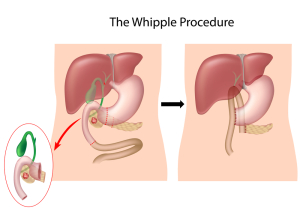For one thing, with regard to treatment of cancer of the pancreas it is important to note that only stage I patients are surgically resectable, while patients with the other stages are not. Indeed, in a large series there were only about 25% of all patients whose pancreatic cancer was amenable to resection (Ref.1, p.858). It must be remembered that surgery for pancreatic cancer patients with stage I cancer is a horrendous one. That is to say, it lasts on average 7 hours and should only be done in a large Cancer Center, where the mortality rate for pancreatic cancer surgery now is only about 5% (in the past it was in the 20% to 30% range).
Surgery for pancreatic cancer, stage I (Whipple procedure)
1st step: the actual surgery
Pancreaticoduodenectomy: this includes removal of gallbladder, stomach outlet, common bile duct, head of pancreas with the cancer in it, all parts of the duodenum and the fist part of the small intestines.
2nd step: reconstruction
Choledochojejunostomy: this reconnects the common bile duct stump to the small bowel.
3rd step: further reconstruction
Pancreaticojejunostomy: the cancer-free tail of the pancreas is connected to the small bowel.
4th step: last part of reconstruction
Gastrojejunostomy: the stomach is sown to a loop of the small bowel.
The Whipple procedure is only for patients who have stage 1 cancer of the pancreas. However, there is still a high recurrence rate, as microscopic metastases will regrow later on. In one trial physicians compared a group of patients with stage I pancreatic cancer treated with surgery only and compared this to a comparable group treated with surgery first and subsequent radiation and chemotherapy to eradicate micro-metastases.
Effect of radiation and chemotherapy on cancer of the pancreas
|
In the first place it is clear that there is a 25% survival advantage after 2 years and a 13% survival advantage after 5 years. However, at the same time compared with other cancers, the overall survival rates are still very disappointing. Nevertheless, when compared though to survival rates of patients receiving no treatment for stage I pancreatic cancer, 100% of them usually die within 8 to 12 months.
Notably, chemotherapy and radiotherapy are not changing the survival figures for patients with stage II or III pancreatic cancer. In particular, surgery has been shown to actually worsen the survival outlook in these patients and this is why at present this is not recommended.
Specifically, the only hope for future breakthroughs in therapy for pancreatic cancer is a new approach, which includes some form of stimulation of the paralyzed immune system. Indeed, such research is on the way as can be seen from Ref. 3 and 4.
References
1. Cancer: Principles &Practice of Oncology.4th edition. Edited by Vincent T. DeVita, Jr. et al. Lippincott, Philadelphia,PA, 1993. Chapter on Cancer of the pancreas.
2. Cancer: Principles&Practice of Oncology. 5th edition, volume 1. Edited by Vincent T. DeVita, Jr. et al. Lippincott-Raven Publ., Philadelphia,PA, 1997. Chapter on Cancer of the pancreas.
3. T Nishihara et al. Jpn J Cancer Res 2000 Aug;91(8):817-824.
4. L Staib et al. Int J Cancer 2001 Apr 1;92(1):79-87.
5. Conn’s Current Therapy 2004, 56th ed., Copyright © 2004 Elsevier
6. Ferri: Ferri’s Clinical Advisor: Instant Diagnosis and Treatment, 2004 ed., Copyright © 2004 Mosby, Inc
7. Suzanne Somers: “Breakthrough” Eight Steps to Wellness– Life-altering Secrets from Today’s Cutting-edge Doctors”, Crown Publishers, 2008







